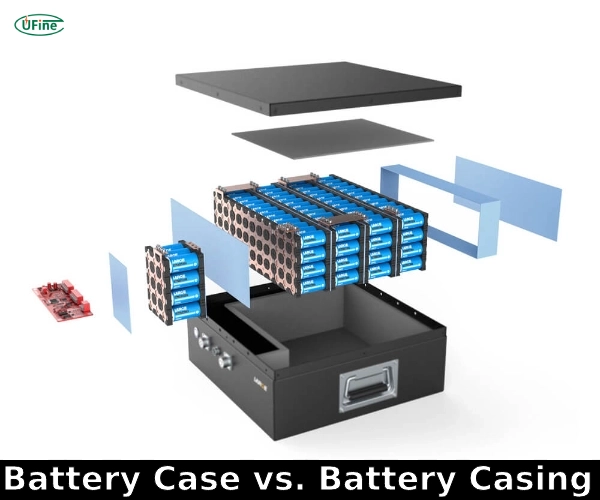Are you confused about the difference between a battery case and a battery casing? You’re not alone! While both are essential for electronic devices, they serve very different purposes. In this guide, we’ll explain everything you need to know, including their definitions, types, functions, and applications. By the end, you’ll have a clear understanding of which one suits your needs and why.
Part 1. What is a battery case?
A battery case is a container designed to hold and protect batteries. It keeps batteries secure and organized, making them easily used in various devices. Battery cases can have one or more batteries in different shapes and sizes to fit specific needs.
Types of Battery Cases
- Plastic Battery Cases: These are lightweight and cost-effective. People commonly use them in everyday devices like remote controls and toys.
- Metal Battery Cases: These offer more durability and protection. People often use them in industrial applications where the battery needs to withstand harsh conditions.
- Rubberized Battery Cases: These cases absorb shocks and provide a good grip. They are perfect for portable devices that users might drop or handle frequently.
- Waterproof Battery Cases: These keep batteries safe from water and moisture. They are ideal for outdoor or marine equipment.
- Customized Battery Cases: Some cases are designed for specific devices, ensuring a perfect fit and optimal performance.
What does the battery case do?
Battery cases play a crucial role in keeping batteries safe and functional. Here’s why they are essential:
- Protection: Battery cases shield batteries from physical damage like drops, bumps, and scratches.
- Organization: They keep batteries in place, preventing them from moving around or getting lost.
- Safety: A good battery case prevents batteries from coming into contact with each other or other metal objects, reducing the risk of short circuits and other accidents.
- Portability: Battery cases make it easy to carry spare batteries around without worrying about damage or loss.
- Extended Battery Life: By protecting batteries from environmental factors like moisture and extreme temperatures, battery cases help extend the life of the batteries.
Part 2. What is a battery casing?
A battery casing is the outer shell surrounding and protecting individual battery cells. Unlike a battery case, which holds multiple batteries or an entire battery pack, the battery casing directly encloses each cell. This is crucial for ensuring safety and efficiency. The casing provides a substantial barrier against external elements, maintaining the integrity and performance of the battery cells.
Types of Battery Casings
- Plastic Casings: Lightweight and cost-effective, plastic casings dominate consumer electronics. They offer essential protection and insulation for the battery cells.
- Metal Casings: Applications requiring higher durability and heat dissipation, such as automotive batteries and power tools, use aluminum or steel casings.
- Ceramic Casings: Ceramic casings provide excellent heat resistance and electrical insulation in high-temperature environments.
- Composite Casings: Made from a combination of materials like plastic and metal, composite casings offer a balance of durability, weight, and cost.
What does the battery casing do?
The primary function of a battery casing is to enclose and protect the individual battery cells. Here are the key reasons why battery casings are essential:
- Prevents Leakage: Battery casings seal the cells, preventing any leakage of electrolytes or other materials, which is vital for safety and performance.
- Protects from Physical Damage: The casing shields the delicate internal components from impacts, punctures, and other physical damage.
- Electrical Insulation: Casings provide necessary electrical insulation, preventing short circuits and ensuring safe operation.
- Thermal Management: Some casings help dissipate heat, preventing the battery from overheating and maintaining optimal performance.
- Chemical Stability: High-quality casings resist corrosion and chemical reactions, maintaining the integrity and longevity of the battery cells.
High-quality casings resist corrosion and chemical reactions, maintaining the integrity and longevity of the battery cells. For more details on safety standards like UN 38.3 and IEC 62133, check out our comprehensive comparison guide.
Part 3. Battery case vs. battery casing
1. Structure
Battery Case:
- Composition: A battery case is typically a box-like container.
- Material: Common materials include plastic, rubber, or metal, depending on the required durability.
- Capacity: Designed to hold multiple batteries or a whole battery pack.
- Compartments: Each battery often has individual slots or compartments to keep it organized.
Battery Casing:
- Composition: A battery casing is a protective shell that encloses a single battery cell.
- Material: Made from metal (aluminum or steel), plastic, or ceramic for high durability and insulation.
- Sealing: It provides a sealed environment around the battery cell to prevent leakage and contamination.
- Thickness: Typically thinner compared to a battery case since it only needs to cover one cell.
2. Function
Battery Case:
- Protection: Shields batteries from external damage such as impacts, moisture, and dust.
- Organization: Keeps multiple batteries organized in one place, making them easy to handle and replace.
- Portability: Often includes features like handles or straps for easy transport.
- Storage: Ideal for storing spare batteries safely.
Battery Casing:
- Enclosure: Encloses the battery cell completely, isolating it from external elements.
- Insulation: Provides electrical insulation to prevent short circuits.
- Thermal Management: Helps manage and dissipate heat to prevent overheating.
- Chemical Protection: Resists corrosion and chemical reactions to maintain the cell’s integrity.
3. Design
Battery Case:
- Variety: Comes in various shapes and sizes to fit different types and numbers of batteries.
- Features: Some designs include waterproof and shockproof features for enhanced protection.
- Aesthetics: Often designed with user-friendly features like clear labeling for easy identification of battery types and statuses.
- Customization: Customization options are available to fit specific devices or user needs.
Battery Casing:
- Precision: Designed to fit the exact dimensions of the battery cell, ensuring a snug and secure fit.
- Durability: Focuses on durability to protect the internal components of the battery cell.
- Heat Dissipation: Some casings include fins or other design elements to aid heat dissipation.
- Seamless Design: Often features a seamless design to prevent any exposure to external elements.
Battery Case vs. Battery Casing: Key Differences at a Glance
| Aspect | Battery Case | Battery Casing |
|---|---|---|
| Material | Plastic, metal, rubber | Plastic, metal, ceramic |
| Purpose | Holds multiple batteries | Encases a single battery cell |
| Applications | Consumer electronics, automotive tools | Electric vehicles, aerospace |
| Design Features | Compartments, portability | Sealing, thermal management |
Part 4. Battery case and battery casing application examples
Let’s delve into some specific examples of where people use battery cases and battery casings:
Battery Case Applications
Battery cases find wide applications in various products and industries:
- Consumer Electronics: Remote controls, toys, and small electronic devices often utilize battery cases to house and protect batteries, ensuring uninterrupted functionality.
- Automotive Accessories: Portable jump starters, tire inflators, and car emergency kits incorporate battery cases to hold batteries for on-the-go power solutions.
- Outdoor Gear: Camping lanterns, flashlights, and GPS devices use battery cases to safeguard batteries from environmental elements during outdoor activities.
- Personal Accessories: Battery-powered devices like watches, calculators, and handheld gaming consoles come with battery cases to hold the batteries securely.
- Medical Devices: Portable medical equipment such as pulse oximeters, thermometers, and infusion pumps use battery cases to provide power for patient care in various healthcare settings.
Battery Casing Applications
Battery casings are crucial in industries where individual battery cells require protection and isolation:
- Electric Vehicles (EVs): Battery casings are essential components within EV battery packs, providing insulation and protection to individual battery cells from external factors like temperature fluctuations and vibrations.
- Aerospace: Battery casings are used in spacecraft and satellites to enclose battery cells, ensuring reliable power supply in space environments with extreme temperatures and vacuum conditions.
- Medical Implants: Implantable medical devices such as pacemakers and neurostimulators rely on battery casings to encase battery cells securely, ensuring long-term performance and patient safety.
- Marine Equipment: Batteries in marine applications, such as boat motors and navigation systems, require robust casings to protect against water intrusion and corrosion in harsh marine environments.
- Industrial Automation: Battery-powered sensors and monitoring devices used in industrial automation systems utilize battery casings to protect against dust, moisture, and chemical exposure in manufacturing environments.
Part 5. How to choose between a battery case and a battery casing?
When deciding between a battery case and a battery casing, consider these factors:
- Device Type: Use a battery case for devices requiring multiple batteries and a casing for single-cell batteries.
- Environment: For outdoor or industrial use, choose waterproof and durable materials.
- Budget: Plastic options are more affordable, while metal or ceramic offers enhanced protection.
Need expert advice? Contact Ufine Battery for tailored solutions!
Part 6. FAQs
-
What is the difference between a battery case and a battery casing?
A battery case holds and organizes multiple batteries, offering portability and protection. In contrast, a battery casing protects individual battery cells, ensuring insulation and preventing leaks or damage. -
How do I know if my battery casing needs replacement?
Check for visible cracks, bulges, corrosion, or leaks. If you notice any of these issues, replace the casing immediately to avoid performance and safety problems. -
Are battery cases waterproof?
Not all battery cases are waterproof. Some are designed with waterproof or water-resistant features, making them suitable for outdoor or marine use. Always check the product specifications to confirm. -
What materials are best for battery casings?
Metal casings, such as aluminum or steel, are preferred for durability and heat dissipation. Plastic casings are lightweight and cost-effective, while ceramic casings excel in high-temperature environments. -
How can I maintain my battery case and casing?
Regularly inspect for damage, clean with a mild detergent, and store in a cool, dry place. Avoid exposing them to extreme temperatures or harsh chemicals.
Related Tags:
More Articles

How to Choose the Right Battery for Blower?
Choosing the right blower battery? Consider voltage, capacity, chemistry & usage. This guide helps match the best battery for peak performance.
How to Choose the Best Insulated Battery Box for Lithium Batteries?
Choosing the Best Insulated Battery Box for Lithium Batteries? Discover key factors such as size, material, and safety for optimal protection and performance.
7 Critical Elements on a Lithium Battery Shipping Label
What must be on a lithium battery shipping label? Learn 7 key elements to ensure safety, legal compliance, and correct handling across all transport modes.
UN3481 vs UN1323: Classification Guide for Lithium Batteries
UN3481 vs UN1323: UN3481 is for lithium batteries in equipment, while UN1323 covers flammable solids and doesn't apply to batteries.
10000mAh Battery Explained: How Long It Lasts, How It Works
A full guide on 10000mAh li-ion batteries, voltage, usage time, and tips. Discover how a 10000mAh battery works, how long it lasts, and how to choose.




